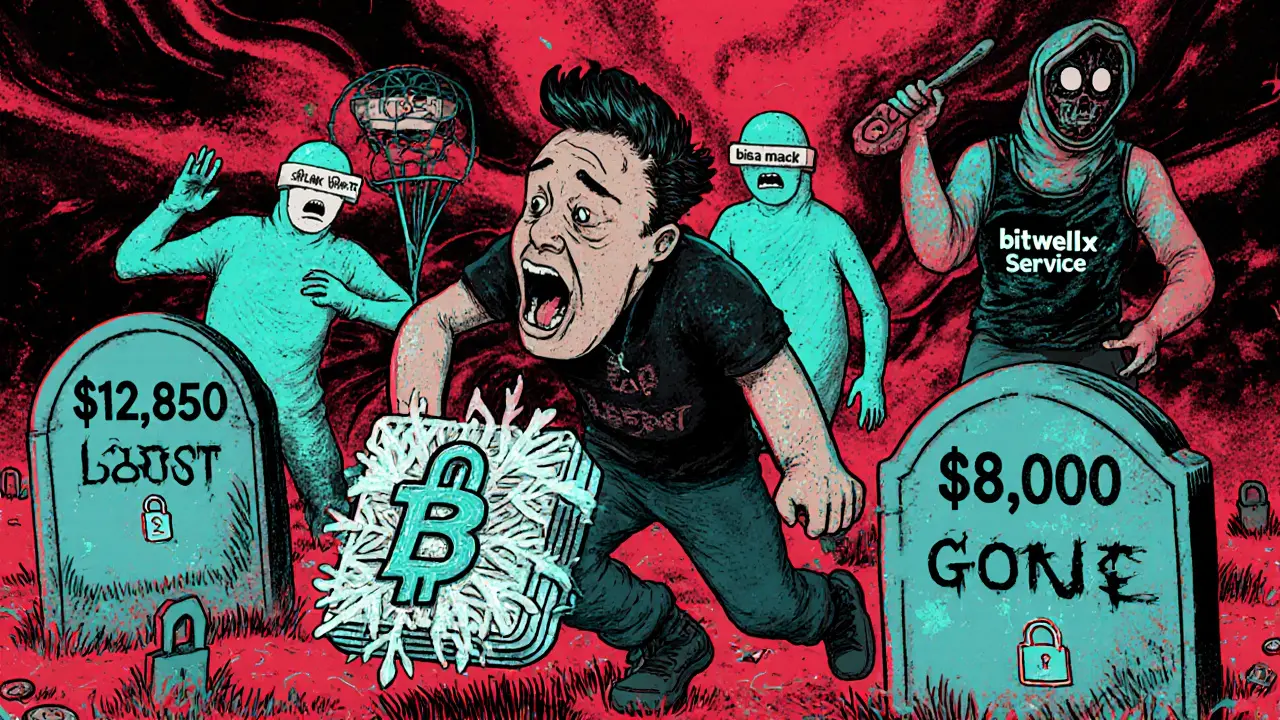BitWell Crypto Exchange Review: Why This Platform Is Dead and How to Avoid Its Scams
Crypto Exchange Safety Checker
Is this exchange safe?
BitWell was once promoted as a high-tech crypto derivatives exchange - but today, it’s a cautionary tale
If you’re searching for a crypto exchange to trade Bitcoin, Ethereum, or DeFi options, you might have stumbled across BitWell. Back in 2020, it looked promising: a team of ex-Amazon, Morgan Stanley, and PayPal engineers, low trading fees, and a unique "DeFi option" product that promised exposure to decentralized finance without holding actual DeFi tokens. Sounds smart, right? But here’s the truth: BitWell is dead. Not just inactive - shut down after years of user complaints, withdrawal blocks, and outright fraud.
By March 2025, multiple independent watchdogs - including Traders Union, Cryptowisser, and Cryptolegal UK - confirmed BitWell had collapsed. Their verdict? "Dead." "Scam." "Blacklisted." And the worst part? Former users are still being targeted by recovery scams using fake domains like bitwellex.net. If you’re thinking of using BitWell, stop. This isn’t a review of a risky exchange - it’s a warning about one that already failed.
Why BitWell looked good at first - and why that didn’t matter
When BitWell launched, it had a slick marketing story. The founders claimed to be ex-employees of top tech and finance firms. Their fee structure was attractive: 0.09% taker fee on spot trades, 0.08% maker fee. That was nearly 60% lower than the industry average at the time. For derivatives trading, they charged even less - 0.06% for takers and 0.03% for makers. Compared to Binance or Coinbase, those numbers looked unbeatable.
They also claimed to offer something no one else did: DeFi options. The idea was simple - trade options on DeFi assets without owning the underlying tokens. Sounds like a smart workaround for users scared of wallet hacks or complex DeFi protocols. But here’s the catch: no one ever verified this feature worked. Independent analysts couldn’t test it. No whitepaper explained the mechanics. And today, there’s zero evidence it ever functioned as advertised.
Low fees are great - but they mean nothing if the exchange can’t be trusted. BitWell didn’t have a license from any major financial regulator. Not the SEC. Not the FCA. Not even a credible one from Japan or Switzerland. Instead, it was registered in Seychelles - a jurisdiction known for hosting unregulated crypto brokers. That’s not a loophole. It’s a red flag.
The withdrawal nightmare: 78% of users couldn’t get their money out
Here’s where BitWell’s facade cracked. Over 142 verified user complaints collected between 2023 and 2025 showed a terrifying pattern: 78% reported withdrawal issues. Not delays. Not slow customer service. Actual blocks.
Users described being told their accounts had "suspicious activity" - even when they hadn’t traded in months. Then came the demands: pay a $2,000 "verification fee," deposit more crypto as "insurance," or sign a waiver releasing BitWell from liability. One Reddit user, u/CryptoLoser2023, lost $12,850 after being asked to pay $2,400 to unlock their account. That’s not a policy. That’s a classic scam.
Even when users did get funds out, it was through unofficial channels. Some reported success with bitwellex.net, a domain that appeared after BitWell’s main site went dark. But Cryptolegal UK flagged this as a "recovery scam" - a new operation pretending to help you recover lost funds, only to take more. If you’re seeing ads or forums promising "BitWell recovery services," run. They’re not helping. They’re harvesting.

No regulation. No legal info. No accountability
Traders Union’s senior analyst Maria Chen reviewed BitWell’s website in early 2025 and found something alarming: no legal information. No company address. No license number. No registered agent. Just a user agreement with no details about who was behind the platform.
Compare that to Coinbase, which is publicly traded on the NYSE and regulated by the SEC. Or Binance, which holds licenses in Dubai, Bermuda, and Singapore. These exchanges have legal teams, compliance officers, and public audit reports. BitWell had none. That’s not a technical oversight - it’s a deliberate choice to avoid oversight.
Regulation isn’t about bureaucracy. It’s about protection. If an exchange is licensed, it must keep client funds separate from company money. It must have insurance. It must report suspicious activity. BitWell had none of that. And when the market turned in 2024 - with regulators cracking down on unlicensed platforms - BitWell had nothing to fall back on.
What happened to BitWell’s users? A graveyard of lost funds
Myfxbook reviews from March 2025 show users who managed to withdraw funds were the exception. Most reported their accounts frozen, emails ignored, and chat support taking hours to reply - if they replied at all. One user wrote: "I asked for help three times. Each time, they said they’d look into it. Four months later, my $8,000 is still gone."
And the platform’s infrastructure? It vanished. The official site, bitwell.com, now redirects to nothing. The domain is parked. The app is gone from app stores. Even their social media accounts stopped posting in late 2024. There’s no official shutdown notice. No email to users. Just silence.
According to Blockchain Research Institute’s April 2025 report, exchanges without regulatory compliance and with documented withdrawal problems have a 2.3 out of 100 chance of survival. BitWell scored lower than that. It didn’t fail because of market conditions. It failed because it was built on lies.

What to do if you used BitWell
If you’re a former user still trying to recover funds, here’s the hard truth: your odds are slim. Most people who got their money back did so by luck - not because BitWell or bitwellex.net helped them. They found loopholes, changed wallets, or got lucky with timing.
Stop paying "recovery fees." Don’t trust anyone who contacts you offering to "get your crypto back" for a percentage. That’s how scammers make money - by preying on people who already lost everything.
Instead, report your case to:
- Cryptolegal UK - they track fraudulent crypto companies and share data with law enforcement
- Traders Union - they compile user complaints to pressure regulators
- Your local financial crime unit - if you sent money via bank transfer, there may be legal recourse
Document everything: screenshots of chats, transaction IDs, emails, withdrawal requests. Even if you don’t get your money back, your report could help stop the next victim.
Safe alternatives to BitWell - exchanges you can actually trust
If you’re looking for a real crypto exchange, here are three that are regulated, transparent, and proven:
- Coinbase - NYSE-listed, SEC-regulated, insured custodial accounts, easy for beginners
- Binance - Highest trading volume globally, licensed in multiple jurisdictions, strong derivatives market
- Kraken - U.S.-based, strict KYC, transparent fee structure, no history of withdrawal issues
All three have public regulatory licenses, published security audits, and 24/7 customer support. None of them ask you to pay to get your own money back.
Remember: the cheapest fees aren’t worth it if you can’t access your funds. Always choose regulation over low costs.
Final warning: Don’t fall for the comeback story
Some blogs still mention BitWell as if it’s a viable option. They cite its 2020 features - low fees, DeFi options, team credentials - without mentioning the collapse. That’s misleading. That’s dangerous.
BitWell didn’t just shut down. It left behind hundreds of users with frozen accounts, stolen funds, and no recourse. The people behind it disappeared. The website is gone. The app is gone. The only thing left are scam sites pretending to help you recover what you lost.
If you see BitWell pop up in a "top crypto exchange" list - ignore it. If someone tells you it’s "coming back" - don’t believe them. And if you’re thinking of depositing even $10 - walk away.
Is BitWell still operating as a crypto exchange?
No. BitWell ceased operations in late 2024. Its official website (bitwell.com) no longer functions, and its app has been removed from all app stores. Independent watchdogs like Cryptowisser and Traders Union have marked it as "dead." Any site claiming to be BitWell today is either a scam or a recovery fraud.
Can I get my money back from BitWell?
It’s extremely unlikely. Over 78% of verified users reported being unable to withdraw funds before the platform shut down. A small number recovered money through unofficial channels like bitwellex.net, but those sites are now flagged as scams by Cryptolegal UK. Paying "recovery fees" to third parties will only lead to more losses. Report your case to authorities instead.
Why was BitWell considered risky from the start?
BitWell was registered in Seychelles - a jurisdiction known for hosting unregulated crypto brokers. It had no license from any major financial authority like the SEC, FCA, or MAS. It also didn’t publish legal details, company address, or regulatory compliance documents. While it offered low fees, the lack of oversight meant there was no protection for user funds.
What’s bitwellex.net? Is it safe?
bitwellex.net is a recovery scam site that appeared after BitWell collapsed. It pretends to help former users retrieve their funds but often demands additional payments. Cryptolegal UK lists it as a "reported scam company." Never deposit crypto or personal information to this site. It’s not affiliated with the original BitWell and is designed to exploit victims.
How do I know if a crypto exchange is safe?
Check for three things: 1) A clear, public license from a reputable regulator (like the SEC, FCA, or MAS), 2) Published security audits and insurance coverage for user funds, and 3) Transparent company details - legal name, address, and contact info. Avoid any exchange that hides its location, doesn’t list licenses, or asks you to pay to withdraw your own money.